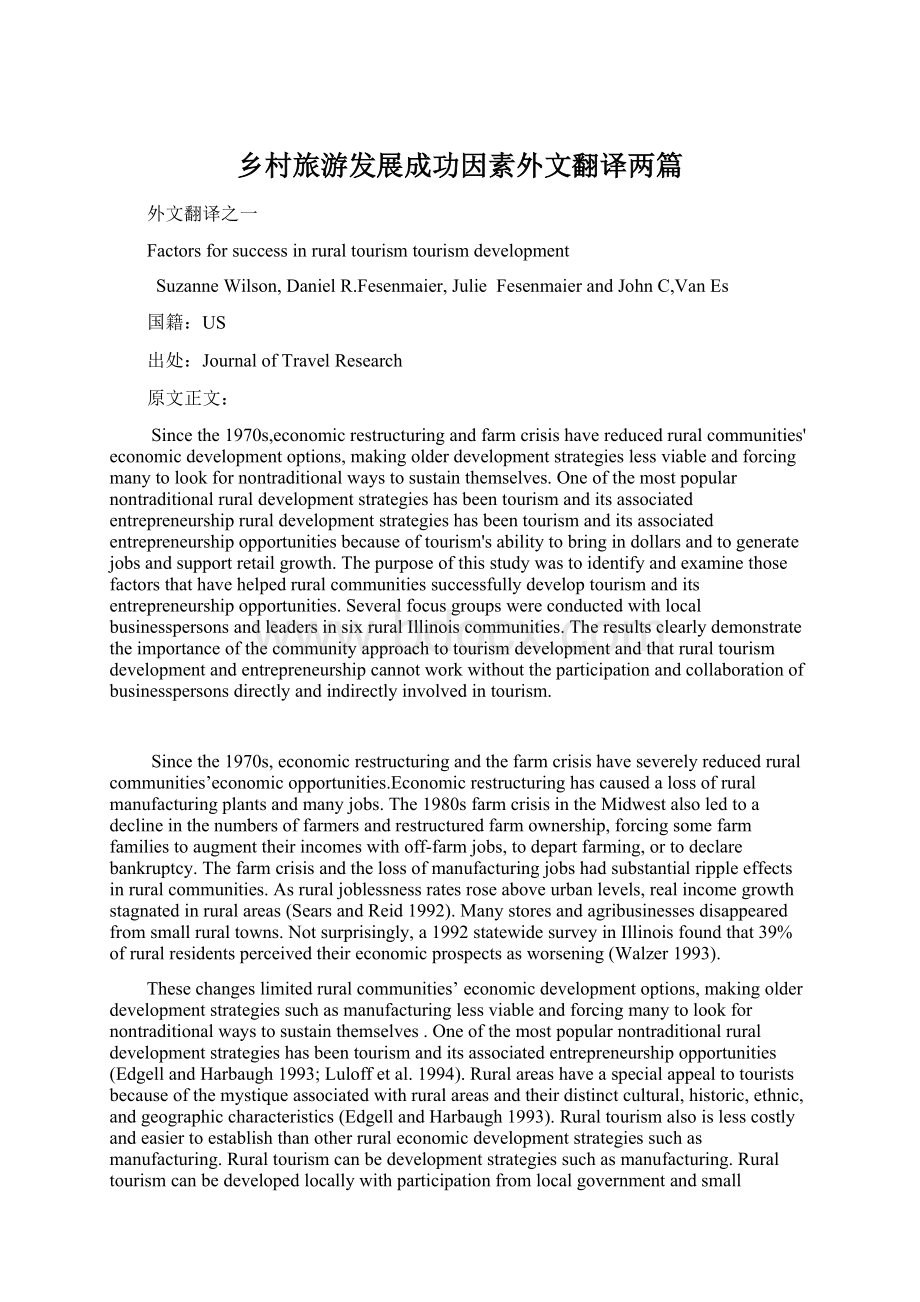乡村旅游发展成功因素外文翻译两篇.docx
《乡村旅游发展成功因素外文翻译两篇.docx》由会员分享,可在线阅读,更多相关《乡村旅游发展成功因素外文翻译两篇.docx(8页珍藏版)》请在冰豆网上搜索。

乡村旅游发展成功因素外文翻译两篇
外文翻译之一
Factorsforsuccessinruraltourismtourismdevelopment
SuzanneWilson,DanielR.Fesenmaier,JulieFesenmaierandJohnC,VanEs
国籍:
US
出处:
JournalofTravelResearch
原文正文:
Sincethe1970s,economicrestructuringandfarmcrisishavereducedruralcommunities'economicdevelopmentoptions,makingolderdevelopmentstrategieslessviableandforcingmanytolookfornontraditionalwaystosustainthemselves.Oneofthemostpopularnontraditionalruraldevelopmentstrategieshasbeentourismanditsassociatedentrepreneurshipruraldevelopmentstrategieshasbeentourismanditsassociatedentrepreneurshipopportunitiesbecauseoftourism'sabilitytobringindollarsandtogeneratejobsandsupportretailgrowth.Thepurposeofthisstudywastoidentifyandexaminethosefactorsthathavehelpedruralcommunitiessuccessfullydeveloptourismanditsentrepreneurshipopportunities.SeveralfocusgroupswereconductedwithlocalbusinesspersonsandleadersinsixruralIllinoiscommunities.Theresultsclearlydemonstratetheimportanceofthecommunityapproachtotourismdevelopmentandthatruraltourismdevelopmentandentrepreneurshipcannotworkwithouttheparticipationandcollaborationofbusinesspersonsdirectlyandindirectlyinvolvedintourism.
Sincethe1970s,economicrestructuringandthefarmcrisishaveseverelyreducedruralcommunities’economicopportunities.Economicrestructuringhascausedalossofruralmanufacturingplantsandmanyjobs.The1980sfarmcrisisintheMidwestalsoledtoadeclineinthenumbersoffarmersandrestructuredfarmownership,forcingsomefarmfamiliestoaugmenttheirincomeswithoff-farmjobs,todepartfarming,ortodeclarebankruptcy.Thefarmcrisisandthelossofmanufacturingjobshadsubstantialrippleeffectsinruralcommunities.Asruraljoblessnessratesroseaboveurbanlevels,realincomegrowthstagnatedinruralareas(SearsandReid1992).Manystoresandagribusinessesdisappearedfromsmallruraltowns.Notsurprisingly,a1992statewidesurveyinIllinoisfoundthat39%ofruralresidentsperceivedtheireconomicprospectsasworsening(Walzer1993).
Thesechangeslimitedruralcommunities’economicdevelopmentoptions,makingolderdevelopmentstrategiessuchasmanufacturinglessviableandforcingmanytolookfornontraditionalwaystosustainthemselves.Oneofthemostpopularnontraditionalruraldevelopmentstrategieshasbeentourismanditsassociatedentrepreneurshipopportunities(EdgellandHarbaugh1993;Luloffetal.1994).Ruralareashaveaspecialappealtotouristsbecauseofthemystiqueassociatedwithruralareasandtheirdistinctcultural,historic,ethnic,andgeographiccharacteristics(EdgellandHarbaugh1993).Ruraltourismalsoislesscostlyandeasiertoestablishthanotherruraleconomicdevelopmentstrategiessuchasmanufacturing.Ruraltourismcanbedevelopmentstrategiessuchasmanufacturing.Ruraltourismcanbedevelopedlocallywithparticipationfromlocalgovernmentandsmallbusinesses,anditsdevelopmentisnotnecessarilydependentonoutsidefirmsorcompanies.Althoughtourismcanbeexpensivetodevelopincertaincases(e.g.,largeresortareas)orcaninvolvelargefirmsandchains,ruraltourismcanbedevelopedwithrelativelylittleinvestmentcredit,training,andcapital.Hence,ruraltourismcanbelesscostlytodevelopascomparedtoothereconomicdevelopmentstrategies;additionally,ruraltourismneednotinvolvedependencyonoutsidefirmsandtheirdecisionsonwhethertheywanttobeinanarea.Ruraltourismprovidesabaseforthesesmallbusinessesthatmightnototherwisebeinruralcommunitiesbecauseoftheirsmallpopulations.Tourismparticularlyhelpstwotypesofsmallbusinessesinruralareas—thosedirectlyinvolvedintourism(e.g.,attractionsandhotels/motels)andthoseindirectlyinvolvedintourism(e.g.,gasstationsandgrocerystores).Additionally,ruraltourismworkswellwithexistingruralenterprisessuchasfarms(e.g.,U-Pickfarms)andcangenerateimportantsecondaryincomeforfarmhouseholds(Oppermann1996).Nonetheless,ruraltourismremainsoneofthefewviableeconomicoptionsforruralcommunities.Likeothereconomicdevelopmentstrategies,ruraltourismrequiresseveralcomponentstobesuccessful.
Tourismdevelopmentinvolves
(1)attractions:
thenaturalandmanmadefeaturesbothwithinandadjacenttoacommunity;
(2)promotion:
themarketingofacommunityanditstourismattractionstopotentialtourists;(3)tourisminfrastructure:
accessfacilities(roads,airports,trains,andbuses),waterandpowerservices,parking,signs,andrecreationfacilities;(4)services:
lodging,restaurants,andthevariousretailbusinessesneededtotakecareoftourists’needs;(5)hospitality:
howtouristsaretreatedbybothcommunityresidentsandemployeesintourismbusinessesandattractions(Gunn1988).Leftoutofthislistaretourismentrepreneursandtheirroleinfosteringthesecomponents.Whiletheabovecomponentsandacommunity’sassetsareclearlyimportanttotourismdevelopment,onlythewidespreadparticipationandcontributionofruraltourismentrepreneurscanensureabroad-basedfoundationforsuccessfultourismdevelopment.Aresearchliteraturehasemergedonhowtobestfacilitatethedevelopmentoftourism.Oneview,drawingheavilyontheeconomicliterature,arguesthattourismanditsassociatedentrepreneurshipopportunitiesarebestdevelopedbyhelpingandcreatingindividualsbusinessesandthenlettingthemcompeteinthemarketplaceforareviewanddescriptionofthisview).Thisview,however,hasbeencritiquedbecause
(1)itviewstourismandtourism-relatedbusinessesasisolatedfromthelargercommunityanditsissues;
(2)itdoesnotrecognizetheinterdependenceofthevarioussectorsandactorsinvolvedintourism;and(3)mostsmalltourismbusiness,especiallythoseinruralareas,donothavetheindividualresourcestopromoteeitherthemselvesorthecommunityasatouristproduct(Gunn1988;Murphy1985;PalmerandBejou1995).Opposingthisviewisthecommunityapproachtotourismdevelopmentandentrepreneurship(Murphy1985).Asitsnameimplies,theapproacharguesthattourismisacommunityproductandthat,alongwithentrepreneurialskillsandthepresenceoftouristbusinesses,itisalsonecessarytohavethecommunityandlocalcapabilities(e.g.,localleadershipandformalandinformalnetworks)directlyinvolvedintourismdevelopmentandpromotioneffort(Murphy1985).Whilethecommunityapproachmaybeaneffectivewaytodevelopandpromotetourism,creatingthenecessaryintercommunitycooperationandcollaborationisacomplexanddifficultprocess.Businessesareaskedtoshareresourceswhilesimultaneouslycompeting.Localgovernmentsmayseecollaboratingtodeveloptourismasrisky,ortheymaybeworriedaboutlosingcontroloverlocaldecisionmaking(HuangandStewart1996;JamalandGetz1995).Becauseoftheseproblems,researchoncollaborationandthosefactorsthatallowforcommunitydevelopmentoftourismisneeded.Thepurposeofthepresentstudyistoidentifyandexaminethosefactorsthathelpruralcommunitiessuccessfullydeveloptourismanditsentrepreneurshipopportunities.Thepresentstudymakesanadditionalcontributiontotheresearchliteraturebyincludingruraltourismentrepreneurs,anoverlookedgroupinruraltourismresearch(Stokowski1990).
乡村旅游开展成功因素
苏珊娜威尔逊,丹尼尔·朱莉和约翰
国籍:
美国
出处:
SAGE出版社
中文译文:
20世纪70年代以来,经济体制的改革和农业危机使得农村社区经济开展的选择减少,同时促使老年人开展战略可行性降低,迫使人们去寻找非传统的方式来维持生计。
乡村旅游及其相关产业开展策略因其为社会带来的资金收入、增加就业时机及支持零售增长的功能而成为时下最流行的非传统农业开展策略之一。
本研究的目的是确定和审查这些因素,帮助农村社区成功走上开展旅游业的创业道路。
几个重点群体在伊利诺斯六个农村社区与当地商人和指导人进展了实验。
结果清楚地说明重要的社区不是直接就是间接地参与到了乡村旅游的开发中。
20世纪70年代以来,经济体制的改革和农业危机的发生已严重阻碍了农村经济的开展,经济构造的调整导致了乡村农业消费力和就业岗位的减少。
20世纪80年代在中西部发生的农业危机也导致了农民和重组制农场的减少,迫使一些农户为增加收入而参与非农工作,或分开农场,或宣布破产。
农场的危机和制造工作的丧失对农村社区产生了重大的影响。
随着农村失业率高于城市程度,实际的收入增长停滞在农村地区〔希尔和瑞德1992〕。
许多商店和农业从农村小城镇消失,毫不奇怪,1992年伊利诺斯州的调查说明,39%的农村居民认为他们的经济前景将恶化〔沃尔泽1993〕。
这些变化限制了农村社区的经济开展方案,使旧式的开展战略例如制造业的可行性降低,并迫使许多人寻找非传统的方式来维持生活。
其中最流行的非传统的农村开展战略当属旅游及其相关的创业时机〔艾基尔和哈博1993;鲁洛夫等人。
1994〕。
农村地区因其神秘独特的文化,历史,民族和地理特征而对游客产生了特殊的吸引力,〔艾基尔和哈博1993〕。
乡村旅游比起其他的农村经济开展战略例如制造业相对来说开发本钱较低且建立较容易。
乡村旅游的开展可以带动制造等的开展。
乡村旅游可以与其所在地的地方政府和小型企业共同开展,但它的开展并不一定依赖于外部企业或公司。
虽然旅游在某些中心地区的开展需要较大的本钱投入或者涉及大公司和连锁企业,但是乡村旅游却可以在较少的信贷投资,人员培训和少量资本情况下得到开展。
因此,乡村旅游相比拟其他的经济开展策略可以在较少投入花费情况下得以开展。
此外,乡村旅游不需要涉及依赖外部公司以及他们是否在同一区域的决定。
乡村旅游为一些因人口少而可能无法留在农村社区的小公司提供了保障。
旅游特别有助于两种类型的小型企业,在农村地区直接参与〔例如,旅游景点和酒店、汽车旅馆〕和间接参与旅游的企业〔例如,加油站和杂货店〕。
此外,乡村旅游与现有的乡镇企业如农场〔例如,采场〕开展较好并且可以为家庭农场产生第二收入〔奥普曼1996〕。
尽管有这些好处,其可行性作为一个经济开展战略,乡村旅游,在一些农村地区业有缺点〔luloff等人。
1994·1989〕。
如农村制造,它可以使得农村社区之间互相竞争。
旅游业的就业,像许多其他效劳部门,仍然是美国最低工资支付阶梯〔1989〕。
旅游及和它相关的工作的消费利润往往是季节性的,一年中只有部分。
然而,乡村旅游对于农村社区仍然是少数可行的经济选择。
像其他的经济开展战略一样,乡村旅游的成功需要假设干部分的组成。
旅游开发涉及〔1〕景点:
社区内自然和人为的功能分区;〔2〕推广:
一个社区和旅游景点的潜在游客的营销;〔3〕旅游设施:
设施〔公路,机场,火车,公共汽车〕,水和电力效劳,停车场,标志,及娱乐设施;〔4〕效劳:
住宿,餐饮,和各种零售企业需要照顾的游客的需要;〔5〕餐饮:
游客在旅游企业和旅游景点被社区居民和雇员如何对待〔甘1988〕。
除上述列表外,还有旅游企业家促进了旅游的开发。
虽然上述成分和社区资产对于旅游开发是非常重要的,只有广泛的参与和奉献,乡村旅游企业家确保广泛的根底,乡村旅游才能成功的开展。
研究文学出现了关于如何最好地促进旅游业的开展的研究。
一个绘制大量的经济试图的文献,认为对旅游业及其相关的创业时机最好的帮助是建立个人企业,让他们在市场上竞争这一观点,但是,一直精益求精,因为它把旅游业及相关企业及其问题作为孤立的大社区;它不成认互相依存,不同的部门和行动者共同参与旅游;〔6〕多数旅游小企业,特别是在农村地区,没有资源,实现自身或社会旅游产品的开发〔甘1988;·1985;帕和bejou1995〕。
反对这一观点的是社区旅游业开展的企业家〔莫非1985〕。
顾名思义,该方法认为,旅游是一个社区和产品,随着旅游企业创业技能的开展,以及当地社区〔例如,当地的指导和正式或非正式网络〕直接参与旅游的开发和促销的努力〔莫非1985〕。
而社区的方法可能是一种有效的方式,推动旅游业的开展,创造了必要的共同合作,合作是一个复杂而困难的过程。
企业资源共享的同时,也有竞争的要求。
地方政府可以看到合作开展旅游业是有风险的,或者他们可能担忧失去地方决策的控制〔黄和斯图尔特1996;贾马尔和盖茨1995〕。
理解这些问题,合作研究这些因素,对于社区旅游业的开展是必要的。
本研究的目的是确定和审查这些因素,帮助农村社区成功开展旅游业,创造创业时机。
本研究额外进展了对在乡村旅游开展中的乡村旅游企业家,一个被无视的群体的研究〔斯托科夫斯基1990〕。
外文翻译之二
RuralTourismandEconomicDevelopment
MarthaFrederick
国籍:
出处:
SAGEPublication
原文正文:
Tourismisapopulareconomicdevelopmentstrategy.Theauthorreviewsthreediversebooksthatstudytourismfromvariou